With the arrival of the New Year, The Genron NPO carried out a survey of informed voters titled "What sort of year do you think 2014 will be?" The results show that among the respondents, concern is spreading over Japan's relations with its neighbors in East Asia. Furthermore, while a certain level of expectation remains for Prime Minister Abe's administration in 2014, over half the respondents replied that "warning lamps will be on all year for the administration," showing that compared to previous surveys, carried out 100 days and one year after the new administration took over, negative opinions are on the rise. It is possible that Abe's visit to Yasukuni Shrine at the end of last year has influenced perceptions among these voters.
This survey was conducted out over the course of one week from Jan. 1 to Jan. 8, 2014, and targeted approximately 2,000 people registered with The Genron NPO. The respondents work in a diverse range of fields, from business, media, academia and research, to the civil service. Replies from a total of 244 people were collected. The main findings are as follows.
Nearly 90 percent of respondents view 2014 as an important year for Japan
When asked what sort of year 2014 would be for Japan, 68.9 percent of respondents replied, "I think it will be an important year that affects Japan's future, but I wouldn't call it decisive." This was the most common answer, and it showed a 7.6 point increase compared to last year. Furthermore, 19.7 percent replied, "I think it will be a decisive year that affects Japan's future," so a combined 88.6 percent of informed voters think 2014 will be an important year for the country.
Improving relations with neighboring countries such as China and Korea is the greatest area of concern
When asked which area of Japanese politics or society was of particular concern, the most frequent answer given was "Improving relations with neighboring countries such as China and South Korea" (42.6 percent). The next most frequent answer was the concern over whether or not the Abe administration's strategy for growth will succeed (34.8 percent), and this was followed by the issue of reinitiating nuclear power generation (28.5 percent).
When compared with the survey carried out in January last year, in which 9.4 percent replied "The Senkaku Islands Issue," 2.9 percent responded "Japan's relations with South Korea," and 2.9 percent answered "Developments in North Korea." From this, it can be seen that there is growing concern among voters regarding the deterioration of relations with both China and South Korea.
Nearly 70 percent of respondents oppose Mr. Abe's visit to Yasukuni Shrine
The survey found that 53.7 percent were against the visit by the prime minister to Yasukuni Shrine, and 15.2 percent said that they were "mostly against" it, so the number of informed voters opposed to the prime minister's visit rose to nearly 70 percent in total. In contrast, 12.7 percent answered that they were in favor of the visit, and 5.3 percent were mostly in favor, so the total number of people supporting the visit did not surpass 18 percent. This shows that Mr. Abe's visit to Yasukuni Shrine in December last year was not supported by nearly 70 percent of voters.
Many are undecided over their expectations for the Abe administration in 2014
When asked about whether they were optimistic regarding the direction of the Abe administration in 2014, the most frequent response was "Neither" (i.e. neither optimistic nor pessimistic) (35.7 percent). The next most frequent response was "Not optimistic" (32.0 percent), and then finally "Optimistic" (24.6 percent). Although many respondents do not hold high hopes for the Abe administration, those not having an opinion either way made up the largest group.
In last year's January survey, 45.9 percent of the respondents had high expectations towards the Abe administration, which was about level with those showing the more negative outlook of "Not optimistic" (46.5 percent). Furthermore, 5.8 percent replied "Not sure," which suggests that one year on from the start of the Mr. Abe's government, voters are becoming more reserved in their judgment.
Half of respondents predict warning lamps will be on for the Abe administration in 2014
When asked what sort of year 2014 would be for the Abe administration, the most common answer was "Various problems will begin to surface, and warning lamps will be on for the administration in 2014" (52.5 percent). Over half of the informed voters surveyed had a negative outlook regarding the ability of the administration to govern in 2014.
Furthermore, 13.1 percent of respondents thought that the Prime Minister's political base itself would begin to fall apart. By comparison, the number who thought that the administration would demonstrate leadership in solving the various problems that arise amounted to no more than 17.6 percent.
Most respondents reply that voters should be the primary agent for solving Japan's problems
When asked who they thought should act as the agent for creating a movement towards solving the problems that Japan faces, the most common answer from those surveyed was, as last year, "the voters (citizens)" (35.2 percent), showing that informed citizens are also demanding voters play a role. The next highest response was "The prime minister" (21.7 percent), so although Mr. Abe was harshly evaluated for his ability to handle the government, a certain level of hope still remains vested in the prime minister.
Outline of the Survey
By occupation, 17.2 percent were business managers or executives, 14.8 percent were company employees, 1.6 percent were media executives, a further 8.2 percent worked in the media, 3.7 percent were national government civil servants, 4.1 percent were local government employees, 0.0 percent were National Diet representatives, 0.8 percent were local assembly representatives, 9.0 percent worked in NPOs or NGOs, 10.2 percent were academics or researchers, 7.0 percent worked with various organizations, 2.5 percent were students, 4.9 percent were self employed, and 13.9 percent did not provide any information regarding occupation.
Question 1. What sort of year do you think 2014 will be for Japan? (Single answer only)
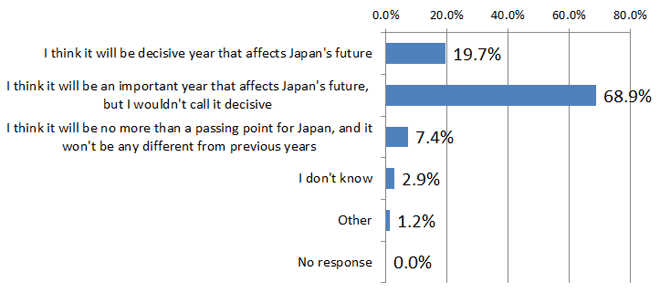
Question 2. What areas of Japanese politics and society are you particularly concerned about in 2014? (Up to 3 answers allowed)
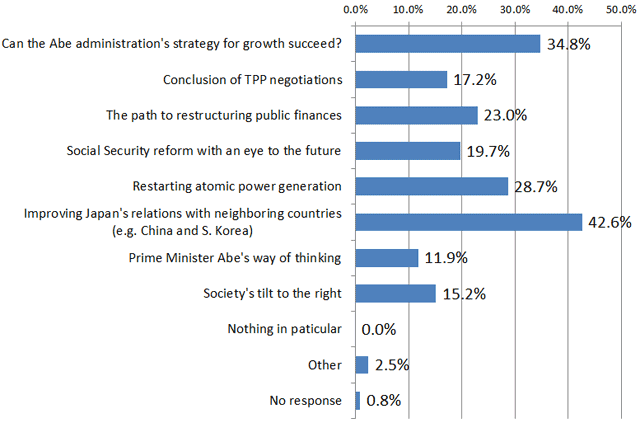
Question 3. On Dec. 26, one year after PM Abe's second administration began, he visited Yasukuni Shrine. Do you agree or disagree with his visit? (Single answer only)
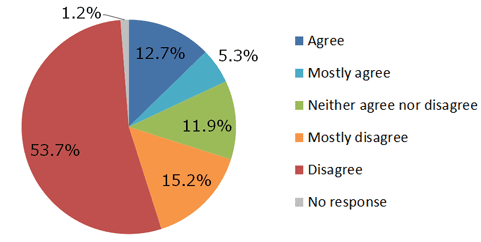
Question 4. Are you optimistic regarding the Abe administration's efforts in 2014. (Single answer only)
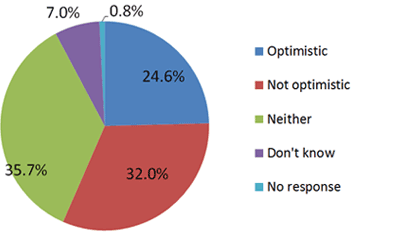
Question 5. What sort of year do you think 2014 will be for the Abe administration? (Single answer only)
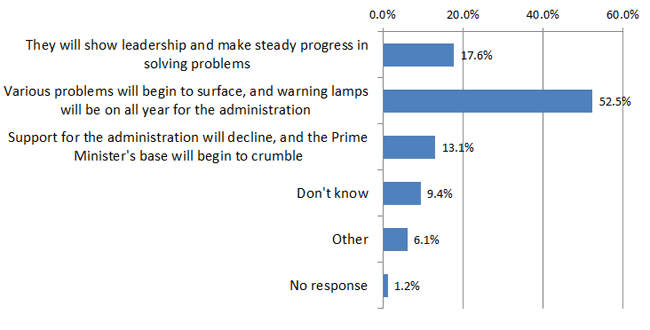
Question 6. In order to make any progress in resolving the issues Japan faces, there needs to be a stronger movement towards bringing more awareness of the issues, and towards helping people meet those issues head-on. Who do you think should act as the agent for getting this movement underway? (Single answer only)
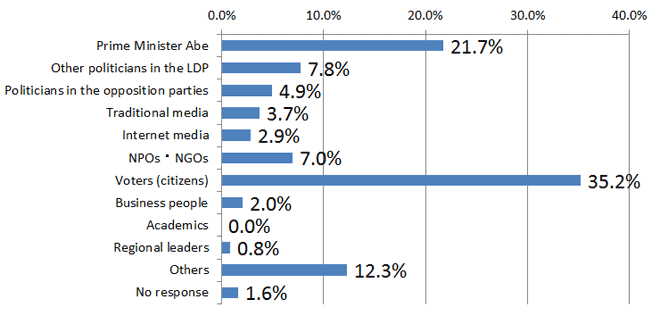
Post a comment